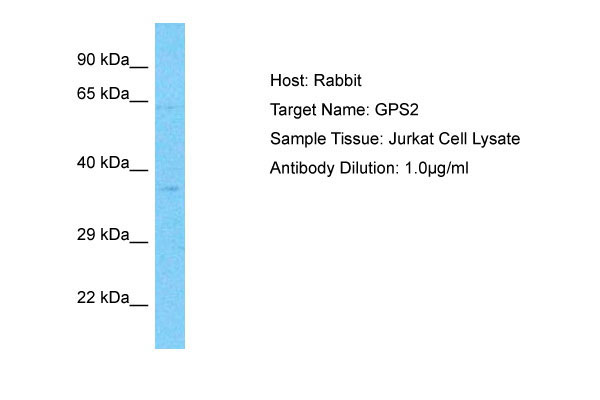GPS2 Antibody - C-terminal region
Rabbit Polyclonal Antibody
- 产品详情
- 实验流程
- 背景知识
Application
| WB |
|---|---|
| Primary Accession | Q13227 |
| Other Accession | XP_005256674 |
| Reactivity | Human |
| Host | Rabbit |
| Clonality | Polyclonal |
| Calculated MW | 36689 Da |
| Gene ID | 2874 |
|---|---|
| Alias Symbol | GPS2, |
| Other Names | G protein pathway suppressor 2, GPS-2, GPS2 |
| Format | Liquid. Purified antibody supplied in 1x PBS buffer with 0.09% (w/v) sodium azide and 2% sucrose. |
| Reconstitution & Storage | Add 50 &mu, l of distilled water. Final Anti-GPS2 antibody concentration is 1 mg/ml in PBS buffer with 2% sucrose. For longer periods of storage, store at -20°C. Avoid repeat freeze-thaw cycles. |
| Precautions | GPS2 Antibody - C-terminal region is for research use only and not for use in diagnostic or therapeutic procedures. |
| Name | GPS2 (HGNC:4550) |
|---|---|
| Function | Key regulator of inflammation, lipid metabolism and mitochondrion homeostasis that acts by inhibiting the activity of the ubiquitin-conjugating enzyme UBE2N/Ubc13, thereby inhibiting 'Lys-63'- linked ubiquitination (By similarity). In the nucleus, can both acts as a corepressor and coactivator of transcription, depending on the context (PubMed:24943844). Acts as a transcription coactivator in adipocytes by promoting the recruitment of PPARG to promoters: acts by inhibiting the activity of the ubiquitin-conjugating enzyme UBE2N/Ubc13, leading to stabilization of KDM4A and subsequent histone H3 'Lys-9' (H3K9) demethylation (By similarity). Promotes cholesterol efflux by acting as a transcription coactivator (PubMed:19481530). Acts as a regulator of B-cell development by inhibiting UBE2N/Ubc13, thereby restricting the activation of Toll-like receptors (TLRs) and B-cell antigen receptors (BCRs) signaling pathways (By similarity). Acts as a key mediator of mitochondrial stress response: in response to mitochondrial depolarization, relocates from the mitochondria to the nucleus following desumoylation and specifically promotes expression of nuclear-encoded mitochondrial genes (PubMed:29499132). Promotes transcription of nuclear-encoded mitochondrial genes by inhibiting UBE2N/Ubc13 (PubMed:29499132). Can also act as a corepressor as part of the N-Cor repressor complex by repressing active PPARG (PubMed:19858209, PubMed:24943844). Plays an anti-inflammatory role in macrophages and is required for insulin sensitivity by acting as a corepressor (By similarity). Plays an anti-inflammatory role during the hepatic acute phase response by interacting with sumoylated NR1H2 and NR5A2 proteins, thereby preventing N-Cor corepressor complex dissociation (PubMed:20159957). In the cytosol, also plays a non- transcriptional role by regulating insulin signaling and pro- inflammatory pathways (By similarity). In the cytoplasm, acts as a negative regulator of inflammation by inhibiting the pro-inflammatory TNF-alpha pathway; acts by repressing UBE2N/Ubc13 activity (By similarity). In the cytoplasm of adipocytes, restricts the activation of insulin signaling via inhibition of UBE2N/Ubc13-mediated ubiquitination of AKT (By similarity). Able to suppress G-protein- and mitogen-activated protein kinase-mediated signal transduction (PubMed:8943324). Acts as a tumor-suppressor in liposarcoma (PubMed:27460081). |
| Cellular Location | Nucleus Mitochondrion. Cytoplasm, cytosol. Note=Sumoylation regulates the subcellular location (PubMed:24943844). Relocates from the mitochondria to the nucleus following desumoylation, leading to mediate mitochondrial stress response (By similarity) {ECO:0000250|UniProtKB:Q921N8, ECO:0000269|PubMed:24943844} |
| Tissue Location | Widely expressed.. |
For Research Use Only. Not For Use In Diagnostic Procedures.
Provided below are standard protocols that you may find useful for product applications.
BACKGROUND
Suppresses G-protein- and mitogen-activated protein kinase-mediated signal transduction.
REFERENCES
Spain B.H.,et al.Mol. Cell. Biol. 16:6698-6706(1996).
Kalnine N.,et al.Submitted (MAY-2003) to the EMBL/GenBank/DDBJ databases.
Ota T.,et al.Nat. Genet. 36:40-45(2004).
Ebert L.,et al.Submitted (JUN-2004) to the EMBL/GenBank/DDBJ databases.
Bechtel S.,et al.BMC Genomics 8:399-399(2007).
终于等到您。ABCEPTA(百远生物)抗体产品。
点击下方“我要评价 ”按钮提交您的反馈信息,您的反馈和评价是我们最宝贵的财富之一,
我们将在1-3个工作日内处理您的反馈信息。
如有疑问,联系:0512-88856768 tech-china@abcepta.com.























 癌症的基本特征包括细胞增殖、血管生成、迁移、凋亡逃避机制和细胞永生等。找到癌症发生过程中这些通路的关键标记物和对应的抗体用于检测至关重要。
癌症的基本特征包括细胞增殖、血管生成、迁移、凋亡逃避机制和细胞永生等。找到癌症发生过程中这些通路的关键标记物和对应的抗体用于检测至关重要。 为您推荐一个泛素化位点预测神器——泛素化分析工具,可以为您的蛋白的泛素化位点作出预测和评分。
为您推荐一个泛素化位点预测神器——泛素化分析工具,可以为您的蛋白的泛素化位点作出预测和评分。 细胞自噬受体图形绘图工具为你的蛋白的细胞受体结合位点作出预测和评分,识别结合到自噬通路中的蛋白是非常重要的,便于让我们理解自噬在正常生理、病理过程中的作用,如发育、细胞分化、神经退化性疾病、压力条件下、感染和癌症。
细胞自噬受体图形绘图工具为你的蛋白的细胞受体结合位点作出预测和评分,识别结合到自噬通路中的蛋白是非常重要的,便于让我们理解自噬在正常生理、病理过程中的作用,如发育、细胞分化、神经退化性疾病、压力条件下、感染和癌症。






